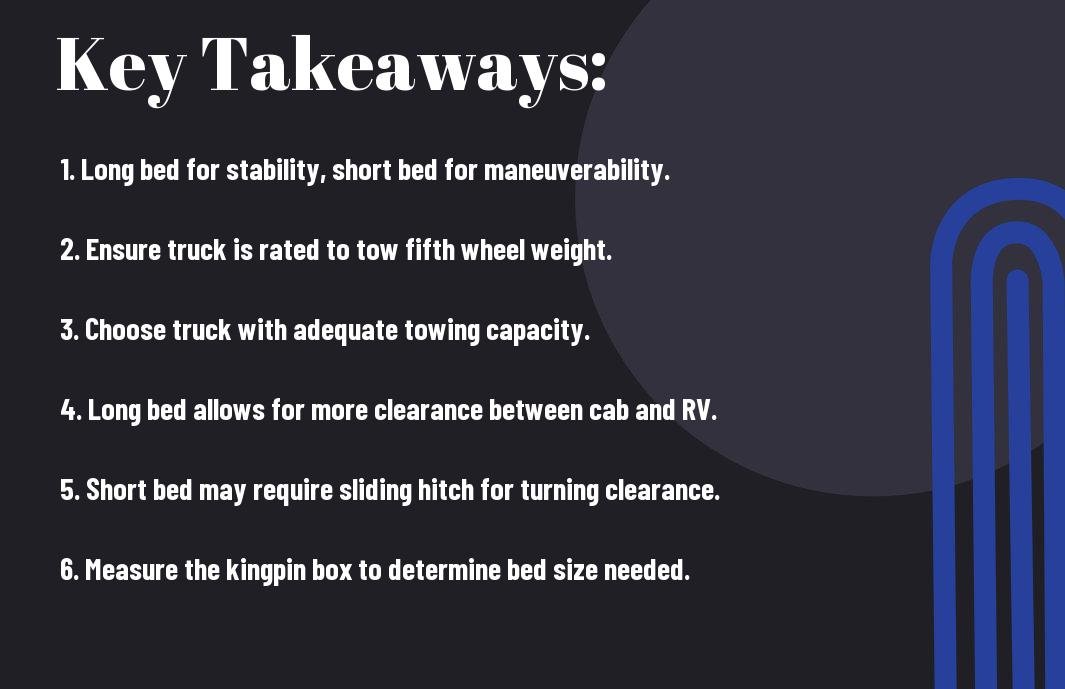Are you considering purchasing a fifth wheel but unsure about the truck bed size you need to tow it? Choosing between a long bed or short bed for your fifth wheel is a crucial decision that can significantly impact your towing experience. The size of the truck bed plays a vital role in ensuring a safe and efficient towing experience. While both long and short bed trucks have their pros and cons, it is essential to understand the specific towing requirements for your fifth wheel and the truck you plan to use. In this blog post, we will discuss the importance of choosing the right truck bed size for your fifth wheel, the necessary truck size for towing, and some key considerations to keep in mind before making your purchase.
Key Takeaways:
- Consider your towing needs: Deciding between a long bed or short bed for your fifth wheel depends on your towing needs. The length and weight of your fifth wheel will determine the size of truck bed required.
- Long bed advantages: A long bed offers more stability and control while towing, especially for larger and heavier fifth wheels. It also provides more space for storage and maneuverability.
- Short bed advantages: A short bed is more maneuverable and easier to park, making it a good option for smaller fifth wheels. However, it may require the use of a slider hitch for tight turns.
- Truck size for towing: The size of the truck required to tow a fifth wheel depends on the weight and size of the trailer. Larger, heavier fifth wheels may require a heavy-duty truck, while smaller ones can be towed with a half-ton truck.
- Truck bed size for towing: The size of the truck bed needed to pull a fifth wheel depends on the size and configuration of the trailer’s hitch. The bed should be long enough to accommodate the hitch without interfering with the cab of the truck.
- Consult with experts: It’s important to consult with experts in towing and truck-trailer compatibility to determine the best setup for your specific fifth wheel and truck combination.
- Consider your driving habits: When deciding between a long bed or short bed and the size of the truck needed, consider your driving habits, parking situations, and the terrain you will be towing in.

Assessing Your Needs
Assuming you are in the market for a fifth wheel and are considering what truck bed size is best for towing, the first step is to assess your needs. Consider how often you will be towing your fifth wheel, the type of terrain you will be driving on, and your storage needs. These factors will help you determine whether a long bed or short bed is more suitable for your towing needs.
Advantages of a Long Bed for Fifth Wheel Towing
Long beds are typically around 8 feet in length, providing more space for your fifth wheel hitch and allowing for greater stability when towing. The extended length of a long bed truck also means there is more space between the cab and the hitch, reducing the risk of damage to either part of the vehicle when making tight turns. Additionally, the longer wheelbase of a long bed truck can improve towing stability and handling, especially at higher speeds. If you plan on towing your fifth wheel frequently or over long distances, a long bed truck may be the better option for you.
Advantages of a Short Bed for Fifth Wheel Towing
A short bed truck, typically around 5 to 6 feet in length, offers greater maneuverability and ease of parking compared to a long bed. This can be especially beneficial if you plan on using your truck for everyday driving in addition to towing your fifth wheel. Additionally, advancements in towing technology, such as sliding hitches and extended pin boxes, have made it possible to safely tow a fifth wheel with a short bed truck. If you prioritize flexibility in your day-to-day driving and parking situation, a short bed truck may be the better option for towing your fifth wheel.
Truck Size Requirements
After deciding to purchase a fifth wheel, the next step is to determine the size of the truck you need to tow it. The size of the truck depends on various factors such as the weight of the fifth wheel, the truck’s towing capacity, and the size of the truck bed. Let’s break down the truck size requirements for towing a fifth wheel.
Understanding Truck Towing Capacity
When it comes to towing a fifth wheel, understanding your truck’s towing capacity is crucial. This refers to the maximum weight your truck can safely tow. Exceeding this capacity can put you at risk of losing control of your vehicle, damaging your truck’s engine, and compromising your safety on the road. Before purchasing a truck for towing a fifth wheel, make sure to check its towing capacity and ensure it meets or exceeds the weight of your fifth wheel.
Matching Truck Size to Fifth Wheel Weight
It’s important to match the size of your truck to the weight of your fifth wheel. A truck with a larger engine and a higher towing capacity is essential for safely towing a heavier fifth wheel. If the truck is too small for the fifth wheel, you may experience difficulty maintaining control and stability while driving. Additionally, the size of the truck bed is crucial in accommodating the hitch and maneuvering the fifth wheel. Make sure to take into consideration the weight of the fifth wheel and choose a truck with the appropriate size and towing capacity.
Truck Bed Considerations
For towing a fifth wheel, the size of your truck bed is an important consideration. It not only affects the handling and maneuverability of your vehicle but also determines the compatibility with the hitch types used for fifth wheel trailers.
Maneuverability and Handling
When it comes to maneuverability and handling, the length of your truck bed plays a crucial role. A longer bed provides better stability and control while towing a fifth wheel. It also reduces the chances of the trailer making contact with the cab of your truck during sharp turns, especially in tight spaces. However, it also means that your overall vehicle length is increased, which can make parking and maneuvering in urban areas more challenging.
Hitch Types and Bed Length Compatibility
The type of hitch you use for your fifth wheel is directly linked to the length of your truck bed. It’s important to ensure that your hitch is compatible with the bed length of your truck to avoid any potential safety issues. For example, a long bed is typically more compatible with a fixed hitch due to the increased clearance between the cab and the trailer. On the other hand, a short bed may require the use of a sliding hitch to provide enough clearance during sharp turns. Generally, a long bed (8-foot) is the most versatile choice for towing a fifth wheel, offering compatibility with a wide range of hitch types and configurations.
After considering the maneuverability and handling advantages of a long bed, as well as the compatibility with different hitch types, it’s clear that a long bed is the preferable choice for towing a fifth wheel. Additionally, it provides more stability and control while towing, ensuring a safer and more comfortable towing experience.
Safety and Legal Requirements
Keep in mind that towing a fifth wheel requires careful attention to safety and legal requirements. The safety of yourself, your passengers, and other drivers on the road is of utmost importance. Additionally, you must comply with towing regulations to avoid legal issues.
Towing Safely: Tips and Best Practices
When towing a fifth wheel, it is crucial to ensure that your truck is properly equipped for the job. Make sure the hitch and the trailer brakes are in good condition, and that the weight distribution is appropriate. Always double-check that the lights and signals on both the truck and the fifth wheel are working properly. When driving, maintain a safe following distance, especially when towing a large and heavy trailer. Any sudden movements can cause the trailer to sway, increasing the risk of an accident.
Compliance with Towing Regulations
It’s essential to familiarize yourself with the towing regulations in your area. This includes understanding the weight limits for your truck and trailer, as well as any specific requirements for towing mirrors and braking systems. Failure to comply with these regulations not only puts you at risk of fines and penalties, but it also jeopardizes your safety and the safety of others on the road.
Conclusion
With these considerations in mind, the decision to get a long bed or short bed for your fifth wheel ultimately comes down to your towing needs and personal preferences. The size of the truck needed to tow a fifth wheel depends on the weight of the trailer, and it is important to choose a truck that can safely handle the load. As for the truck bed size, a long bed is generally recommended for pulling a 5th wheel to provide better stability and maneuverability, but a short bed can work with the correct hitch and accommodations. Always consult with a professional or do thorough research before making a decision to ensure you have the right setup for safe and enjoyable towing experience.
Fifth Wheel Truck Bed FAQ
Q: Should I get a long bed or short bed for my fifth wheel?
A: Generally, a long bed is recommended for towing a fifth wheel. This provides better stability and maneuverability when towing. However, some short bed trucks can accommodate a fifth wheel with the use of a slider hitch or a pin box extension.
Q: What size truck do you need to tow a fifth wheel?
A: The size of the truck needed to tow a fifth wheel depends on the weight of the fifth wheel. Generally, a heavy-duty truck such as a 3/4 ton or 1 ton truck with a diesel engine is recommended for towing a fifth wheel. The truck should have the appropriate towing capacity for the weight of the fifth wheel.
Q: What size truck bed is needed to pull a 5th wheel?
A: The size of the truck bed needed to pull a 5th wheel is typically 6.5 feet or 8 feet in length. The 6.5 foot bed is more common and can accommodate most fifth wheel hitch installations. However, if you have a short bed truck, a slider hitch or a pin box extension may be necessary to prevent cab and trailer contact during tight turns.
Q: Can a short bed truck tow a fifth wheel?
A: Yes, a short bed truck can tow a fifth wheel with the use of a slider hitch or a pin box extension. These devices help to create more space between the cab of the truck and the front of the fifth wheel, allowing for better maneuverability without the risk of contact during sharp turns.
Q: What are the advantages of a long bed over a short bed for towing a fifth wheel?
A: A long bed provides better stability and maneuverability when towing a fifth wheel. It also allows for easier hitching and unhitching of the trailer. Additionally, a long bed truck typically has a larger payload capacity, which may be beneficial when carrying heavier loads in the truck bed while towing the fifth wheel.
